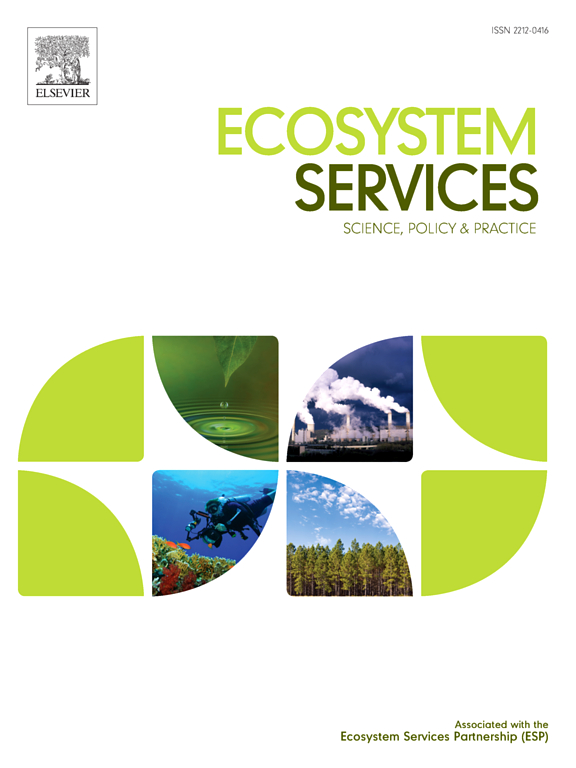节肢动物在英国防治害虫效益的经济评估
IF 6.6
2区 环境科学与生态学
Q1 ECOLOGY
引用次数: 0
摘要
节肢动物作为作物害虫调节者的作用与那些作为作物传粉者的物种相比,尚未得到充分的研究。虽然传粉服务已被广泛研究,但天敌提供的害虫控制的经济价值仍未得到充分探索。这些天敌对农作物害虫的抑制可以为农业减少作物损失提供重要价值。在这里,我们估计了节肢动物天敌在英国为小麦(Triticum spp.)、大麦(Hordeum vulgare)和油菜(Brassica napus)作物提供害虫治理服务的经济价值。我们使用结构化的文献检索来参数化经济生产函数,以估计英国节肢动物天敌提供的有害生物治理的平均年价值。然后,我们模拟了不同程度的天敌存在对经济效益的影响。在一个完整的天敌群落中,10%的边际损失对每公顷大麦的估计价值为108.98 - 171.13英镑,对油菜的估计价值为36.93 - 73.97英镑,对小麦的估计价值为0.74 - 9.60英镑。我们进行了敏感性分析,以评估这些效益在整个油田管理策略中的稳健性。在天敌的功效、作物产量反应、经济阈值和田间管理等方面存在不确定性。解决这些不确定性的来源和量化有害生物管制的经济价值可以为可持续的有害生物管理战略和更广泛的昆虫保护实践提供信息。本文章由计算机程序翻译,如有差异,请以英文原文为准。
Economic valuation of pest regulation benefits provided by arthropods in the UK
The role of arthropods as regulators of crop pests has gone underexamined in comparison to those species that are crop pollinators. While pollination services have been widely studied, the economic value of pest regulation provided by natural enemies remains underexplored. The suppression of insect crop pests by these natural enemies may provide substantial value to agriculture in reduced crop losses. Here, we estimate the economic value of pest regulation services provided by arthropod natural enemies in the UK for wheat (Triticum spp.), barley (Hordeum vulgare), and oilseed rape (Brassica napus) crops. We used a structured literature search to parameterise an economic production function to estimate the average annual value of pest regulation provided by arthropod natural enemies in the UK. We then simulated changes in economic benefits across different levels of natural enemy presence. A marginal 10% reduction from a full community of natural enemies had an estimated value per hectare between £108.98 − £171.13 for barley, £36.93 − £73.97 for oilseed rape, and £0.74 − £9.60 for wheat. We performed sensitivity analysis to evaluate how robust these benefits were across field management strategies. There are areas of uncertainty around the efficacy of natural enemies, crop yield response, economic thresholds, and field management. Resolving these sources of uncertainty and quantifying the economic value of pest regulation could inform sustainable pest management strategies and wider insect conservation practice.
求助全文
通过发布文献求助,成功后即可免费获取论文全文。
去求助
来源期刊

Ecosystem Services
ECOLOGYENVIRONMENTAL SCIENCES&-ENVIRONMENTAL SCIENCES
CiteScore
14.90
自引率
7.90%
发文量
109
期刊介绍:
Ecosystem Services is an international, interdisciplinary journal that is associated with the Ecosystem Services Partnership (ESP). The journal is dedicated to exploring the science, policy, and practice related to ecosystem services, which are the various ways in which ecosystems contribute to human well-being, both directly and indirectly.
Ecosystem Services contributes to the broader goal of ensuring that the benefits of ecosystems are recognized, valued, and sustainably managed for the well-being of current and future generations. The journal serves as a platform for scholars, practitioners, policymakers, and other stakeholders to share their findings and insights, fostering collaboration and innovation in the field of ecosystem services.
 求助内容:
求助内容: 应助结果提醒方式:
应助结果提醒方式:


